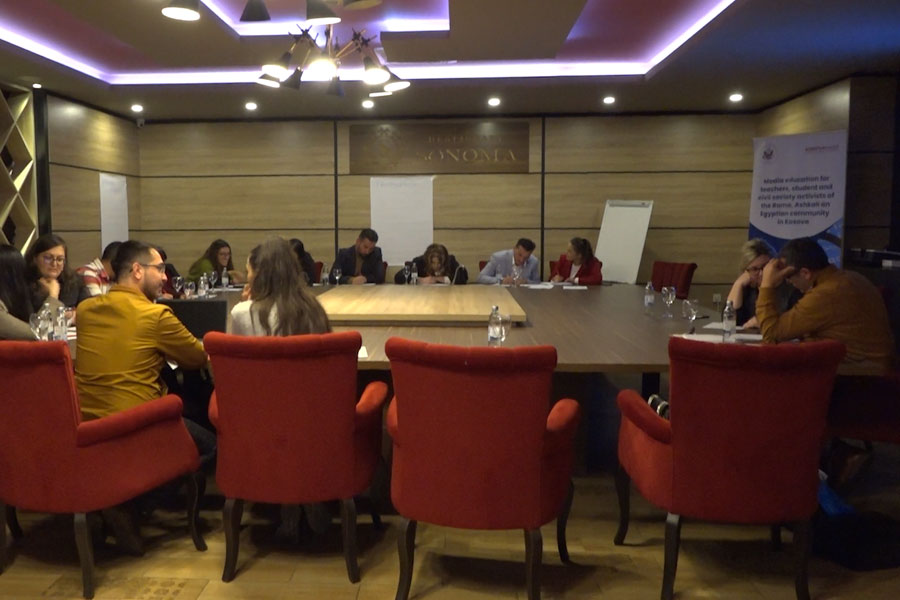
With financial support of the US Embassy in Prishtina, "KosovaPress" News Agency, together with the non-governmental organization "Young Community Leaders Center/YCLC", from today started the seven-month project “Media education for teachers, students, and civil society activists of the Roma, Ashkali, and Egyptian community in Kosovo”, through which the aim is to raise the awareness of communities against disinformation, as well as to strengthen the role of civil society activists from the Roma, Ashkali and Egyptian communities in preventing disinformation in their community.
The aim of this project is to help members of the Roma, Ashkali and Egyptian communities in Kosovo, to protect themselves from disinformation spread across various internet platforms, and to raise their awareness of the danger of fake news, so that they are ready to react to disinformation.
The manager of this project, Fadil Miftari, said that the training “Media education for teachers, students, and civil society activists of the Roma, Ashkali, and Egyptian community in Kosovo”, focuses mainly on raising the awareness of these three communities to build a quality concept of thinking about media education.
Miftari said that this project is divided into two phases, where the first phase includes the teachers of primary schools from the sixth to the ninth grade, where today the first training for the teachers of the municipality of Fushe Kosovo was officially held.
Whereas, the second phase, which starts from December of this year, until February of 2023, includes professors and secondary school students, from grades 10 to 12.
"The project will last 7 months and is divided into two phases, the first phase, the first training starts today with the teachers of the primary schools of Fushe Kosovo, then, after two weeks, it will be held in Mitrovica, Gjakova and Prizren. These are the municipalities that we have focused on, due to the larger number of these communities... then we will start with the second phase that will start in December, where the focus will be on high school students and professors. There will be joint trainings so that there will be an interaction between them, and in March next year, where a workshop will be organized with civil society activists, who will continue to prepare the community on how to prevent disinformation", said Miftari.Whereas, the coordinator of the "Young Community Leaders Center" organization, Burhan Gashi, considers the topic of this project to be appropriate, since the members of the communities are often victims of disinformation due to the low level of education.
Gashi said that such trainings help citizens to distinguish between true and fake news.
"The topic of the project and training is quite specific and important, especially for the Roma, Ashkali, Egyptian communities, because like all the citizens of Kosovo, it is also very important for us to have access to accurate sources and not fall prey to the news that are not real, and different interest groups... the low level of education makes the members of these three communities often unable to distinguish or notice, between true and fake news", said Gashi.The participants in this project were satisfied with the information being provided in this training, while they emphasized the need for such trainings, that talk about disinformation, to become more frequent.
Emel Qehaja-Elshani, teacher of the subject of Technology at "Selman Riza" elementary school, in Fushe Kosovo, who comes from the ranks of the Egyptian community, said that this training is providing necessary information on how to protect from disinformation.
"Being informed is a very good thing and welcomed by all, not only communities... it is welcome because we need to know how to protect ourselves, knowing that technology has already advanced and is advancing day by day, and so we need to know how to protect ourselves...we are all connected to a smartphone, and have an email address, now when we use Facebook, and also TikTok, it is necessary to know what are the disadvantages and advantages, and what information we receive, and from whom, and how to protect ourselves from that information... I expect to share with the students the things that I learned from this training", she said.Betim Ahmeti, secretary at the "Daut Bogujevci" lower secondary elementary school, in Fushe Kosovo, also participated in this training. According to him, such trainings that talk about fake news, also help teachers in their work process.
"These help us in our work process, especially the teachers, where it is known that our school also consists of the Ashkali and Egyptian communities... there are about 150 students there, and I believe that what we achieved here, we will treat them together and send the message to them in the best way... it has an impact on a part of the students, with what they see on social networks, they get bad information and then distribute it in the school where we are. It is good to make them aware, but we also get good experiences by learning something from this, and passing it on to them, it would contribute a lot to them", Ahmeti said.
The training “Media education for teachers, students, and civil society activists of the Roma, Ashkali, and Egyptian community in Kosovo” will continue its journey after Fushe Kosovo, in Mitrovica, Prizren and Gjakova.The project “Media education for teachers, students, and civil society activists of the Roma, Ashkali, and Egyptian community in Kosovo” is supported by the United States Embassy in Prishtina.


